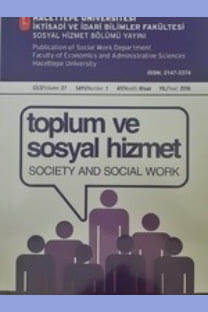TÜRKİYE’DEKİ SIĞINMACILARIN PSİKOSOSYAL SAĞLIĞI
Sığınmacılık, sığınmacıların psikososyal sorunları, psikososyal sağlık
Psychosocial Health of Asylum Seekers in Turkey
___
- Bülbül, S. (1998) “Mülteci Ve Sığınmacıların Sağlık Sorunları”, Umuda Doğru Sığınmacı ve Göçmenlerle Dayanışma Derneği Dergisi, 2 (5)
- Dünya Sağlık Örgütü. (1996) Mültecilerin Akıl Sağlığı, Cenevre.
- Editorial. (1999) “The Crime of Seeking Asylum”, America, April 12.02.2002
- Fassil, Y. (2000) “Looking After The Health of Refugees”, British Medical Journal, 1 (321) 21.02.2001
- Ferris, G. E. (1998) Uprooted Refugees and Forced Migrants, New York, Friendship.
- Hakovirta, H. (1993) “The Global Refugee Problem: A Model and its Application”, International Political Science Review, 14 (1) 35-57.
- Hodes, M. (1998) “Refugee Children May Need a lot of Psychiatric Help”, British Medical Journal, 316 (7134) 14.03.2001
- Lobo, M. (1993) “The Plight of Refugees”, World Health, 46 (6) 22.03.2001
- Muzenda, N. T. (1995) “The Role of Social and Economic Factors and Natural Disasters in Forced Population Displacement in Africa”, International Journal of Refugee Law Special Issue, 51-55.
- Nobel, P. (1992) “Blurred Vision in The Rich World and Violations of Human Rights-a Critical Assessment of The Human Rights and Refugee Linkage”, United Nations Bulletin of Human Rights, 91 (1)
- Padilla, C. Y. (1997) “Immigrant Policy: Issues for Social Work Practice”, Social Work, 42 (6)
- Rado, T. (1997) “Psychoreactive Depression:Refugees and Alcohol Abuse”, Migration World Magazine, 25 (5) 14.03.2001
- Summerfield, D. (1991) “Mental Health of Refugees and Displaced Person”, The Lancet, 338 (8777) 25.01.2001
- Turner, S. (1995) “Torture, Refugee and Trust”, Valentine, D. ve J.C. Knudsen. (ed) Mistrusting Refugees, USA, University Of California Press. UNHCR. (2001) “Asylum Applications”, Ankara.
- Yalazan, İ., N, Şahin, N, Ceylan. (2002) “Mülteci Hakları ve Sosyal Hizmetler Çalışma Grubu Raporu”, Karataş, K. (ed) Değişen Türkiye’de İnsan Hakları Açısından Sosyal Hizmetler Konferansı, Ankara, Sosyal Hizmet Uzmanları Derneği Yayını, No: 6.
- Zolberg, R., S. Aristide, A. Suhrke, S. Aguayo. (1989) Escape From Violence: Conflict and The Refugee Crises in The Developing World, New York, Oxford University.
- ISSN: 2147-3374
- Yayın Aralığı: 4
- Başlangıç: 2000
- Yayıncı: Hacettepe Üniversitesi İktisadi ve İdari Bilimler Fakültesi
ZİHİNSEL ENGELLİ ÇOCUĞA SAHİP ANNELERİN PSİKO-SOSYAL VE SOSYOEKONOMİK SORUNLARI
TÜRKİYE’DEKİ SIĞINMACILARIN PSİKOSOSYAL SAĞLIĞI
İNTERNETTEKİ SAĞLIK SİTELERİNDE KARŞILAŞILAN BİLGİLERİN DOĞRULUĞU VE NİTELİĞİ İLE İLGİLİ KRİTERLER
Songül ACAR VAİZOĞLU, Fehminaz TEMEL, Buğra ALPAN, İsmail Bural BAL, Münir Demir BAJİN, Demet Funda BAŞ, Ozan BİTİK, Barış BÜKE, Çağatay GÜLER
